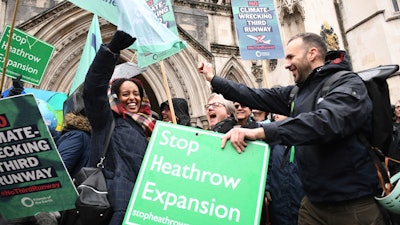
LONDON (AP) — Heathrow Airport's plans to increase capacity of Europe's biggest travel hub by over 50% were stalled Thursday when a British court said the government failed to consider its commitment to combat climate change when it approved the project.
The ruling throws in doubt the future of the 14 billion-pound ($18 billion) plan to build a third runway at Heathrow, the west London hub that already handles more than 1,300 flights a day.
While Heathrow officials said they planned to appeal, Prime Minister Boris Johnson's government indicated it wouldn't challenge the ruling by the Court of Appeal.
“We won!'' said London Mayor Sadiq Khan, a long-time opponent of the project who joined other local officials and environmental groups in challenging the national government's approval of Heathrow's expansion plans.
At stake is a project that business groups and Heathrow officials argue is crucial for the British economy as the U.K. looks to increase links with countries from China to the United States after leaving the European Union. Heathrow has already reached the capacity of its current facilities, and a third runway is needed to serve the growing demands of travelers and international trade, they say.
Environmental campaigners, however, challenged the project because of concerns that a third runway would encourage increased air travel and the carbon emissions blamed for global warming. The British government has committed to reducing greenhouse gas emissions as a signatory to the 2016 Paris Agreement, which seeks to limit temperature increases to 1.5 degrees Celsius over pre-industrial levels.
The court upheld the appeal, saying the government had failed to consider its commitments under the Paris Agreement when it approved a national policy on airport capacity in southeastern England that paved the way for a third runway at Heathrow. That policy statement backed the Heathrow project over a competing plan from Gatwick Airport, 30 miles (50 kilometers) south of central London, and a proposal to build a new airport in the Thames estuary east of London.
In a narrowly written opinion, the three-judge panel stressed that it wasn't ruling on the merits of the Heathrow project. Instead, the court said the national policy statement would be suspended until the government has reviewed the findings in accordance with Britain's obligations under the Paris Agreement.
"We have not found that a national policy statement supporting this project is necessarily incompatible with the United Kingdom's commitment to reducing carbon emissions and mitigating climate change under the Paris Agreement, or with any other policy the Government may adopt or international obligation it may undertake,'' the court said.
“The consequence of our decision is that the Government will now have the opportunity to reconsider the (national policy statement) in accordance with the clear statutory requirements that Parliament has imposed.”
The Department for Transport said the government wouldn't challenge the ruling.
“We take seriously our commitments on the environment, clean air and reducing carbon emissions,'' the department said in a statement. ”We will carefully consider this complex judgment and set out our next steps in due course.''
Heathrow said the issue raised by court's ruling is "eminently fixable,'' and it will work with the government to resolve the problem. The airport also said it planned to appeal the ruling to the Supreme Court.
"Expanding Heathrow, Britain's biggest port and only hub, is essential to achieving the Prime Minister's vision of global Britain,'' the airport said in a statement. "We will get it done the right way, without jeopardising the planet's future.''
Thursday's ruling is just the latest twist in a 13-year battle over increasing airport capacity in and around London.
Choosing a project pits the economic benefits of expansion against the pollution, noise and congestion that it will produce. The issue is so toxic that politicians created an independent commission to weigh the options.
Amid furious public relations battles, the Airports Commission in 2015 backed a third runway at Heathrow. Parliament finally approved the airport policy statement in June 2018.
But things have changed since then. Most notably, perhaps, is Boris Johnson's election as prime minister last year. Johnson, a long-time opponent of Heathrow expansion, once promised to lie down in front of the bulldozers to prevent construction of the third runway.
Tony Travers, an expert on London issues at the London School of Economics, pointed out that the debate over Heathrow has been going on intermittently since the 1960s and choosing another option to expand airport capacity would take years.
Meanwhile, the government has staked its future on increasing trade with nations outside the EU, and in this context it makes little sense to ignore the Heathrow project.
“Brexit means trade with countries further away than you can get on a train,'' Travers said.
The Department for Transportation argued that the Heathrow project would permit an additional 260,000 flights a year and give a 74 billion-pound ($99 billion) boost to the British economy over 60 years.
Tim Alderslade, chief executive of Airlines U.K., an industry body representing U.K.-registered airlines, described Thursday's decision as “extremely disappointing.''
"The economic prize is enormous if expansion is done right, with airlines ready to respond to the unlocking of new capacity by creating new routes and helping to connect the U.K. to new markets and destinations,'' he said.
The court dismissed appeals that dealt with issues such as noise and air pollution raised by Heathrow's neighbors.
But local campaingers, some of whom have been fighting expansion for decades, popped champagne corks and cheered when they heard the ruling. Many saw it as decisive.
“It surely must be the final nail in the coffin for Heathrow's attempts to steamroll over local and national opposition to their disastrous third runway plans,'' said Gareth Roberts, the leader of Richmond Council, the local government body for a community in the flight path of the proposed runway. "The expansion of Heathrow would be a catastrophe for our climate and environment and for the thousands of Londoners who would be forced to live with the huge disruption it will cause.''






















